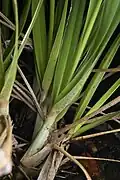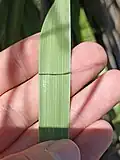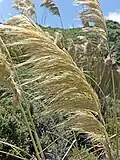Austroderia splendens
| Austroderia splendens | |
|---|---|
_N.P.Barker_and_H.P.Linder_(AM_AK289917).jpg)
| |
| Scientific classification | |
| Kingdom: | Plantae |
| Clade: | Tracheophytes |
| Clade: | Angiosperms |
| Clade: | Monocots |
| Clade: | Commelinids |
| Order: | Poales |
| Family: | Poaceae |
| Genus: | Austroderia |
| Species: | A. splendens
|
| Binomial name | |
| Austroderia splendens (Connor) N.P.Barker & H.P.Linder
| |
| Synonyms[2] | |
| |
Austroderia splendens, the toetoe, is a species of grass in the family Poaceae, native to New Zealand.[2]
Description
Austroderia splendens is a grass with tall tussocks of up to 6 m (20 ft) tall. It can be distinguished from other Austroderia due to having wider, more flexible leaves,and by its leaf blade, which above the ligule is densely hairy.[3][4]
Taxonomy
The species was first described in 1971 by Henry Connor using the name Cortaderia splendens.[3] Connor identified the taxon as being distinct after discovering that some members of toetoe found near Raglan, originally thought to be Cortaderia toetoe, lacked triterpene methyl ethers.[3]
Range and habitat
The species is endemic to New Zealand, found on the North Island as far south as Waikawau and the Ohiwa Harbour, and on off-shore islands including Manawatāwhi / Three Kings Islands.[4] The species is primarily found in coastal areas.[3]
Gallery
-
_N.P.Barker_and_H.P.Linder_(AM_AK339898).jpg) Herbarium specimen
Herbarium specimen -
 Stem
Stem -
 Leaves
Leaves -
 Flower
Flower -
 Austroderia splendens in sand dunes
Austroderia splendens in sand dunes
References
- ^ "Austroderia splendens (Connor) N.P.Barker & H.P.Linder". New Zealand Threat Classification System (NZTCS) Department of Conservation (New Zealand). 2024. Retrieved 12 August 2025.
- ^ a b "Austroderia splendens (Connor) N.P.Barker & H.P.Linder". Plants of the World Online. Board of Trustees of the Royal Botanic Gardens, Kew. Retrieved 12 August 2025.
- ^ a b c d Connor, H. E. (September 1971). "Cortaderia splendens Connor sp. nov. (Gramineae)". New Zealand Journal of Botany. 9 (3): 519–525. doi:10.1080/0028825X.1971.10430197. ISSN 0028-825X. Wikidata Q54670240.
- ^ a b de Lange, P.J. "Austroderia splendens Fact Sheet". New Zealand Plant Conservation Network. Retrieved 12 August 2025.
